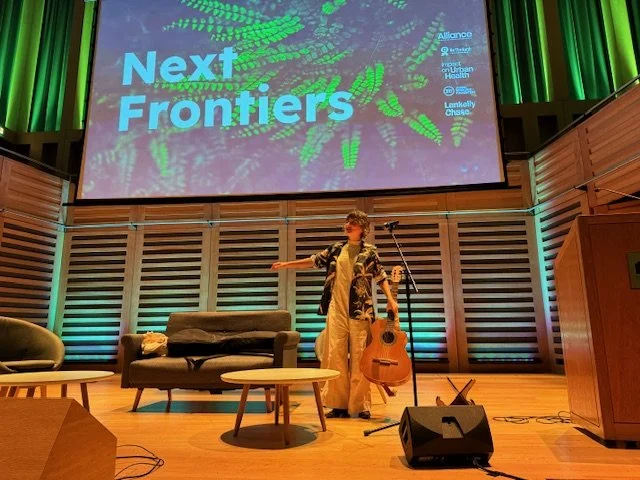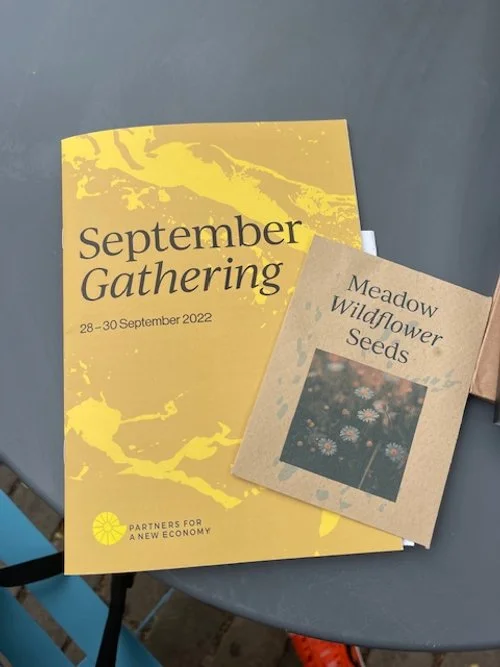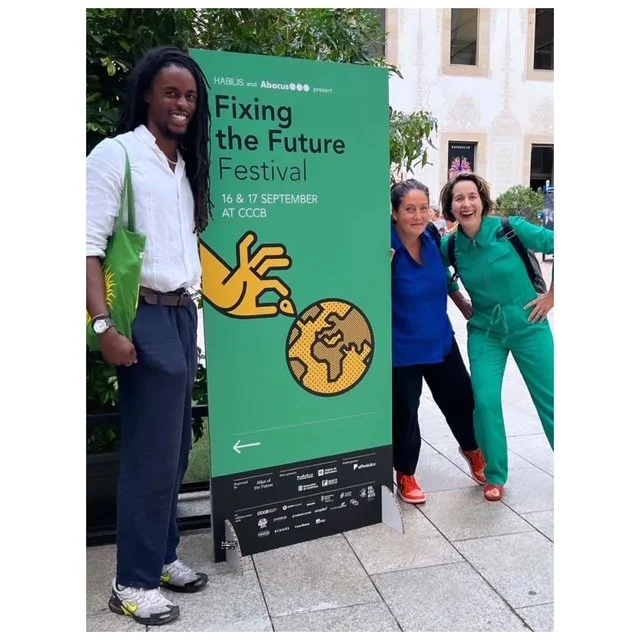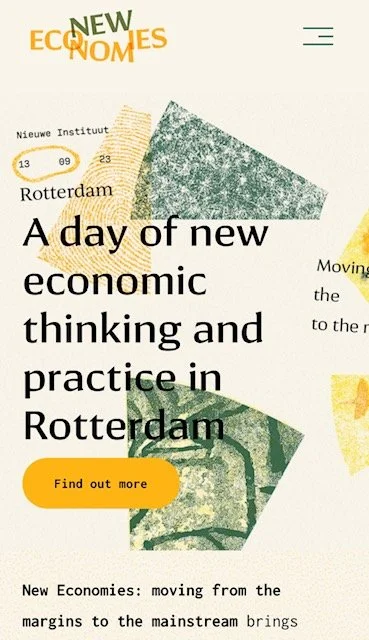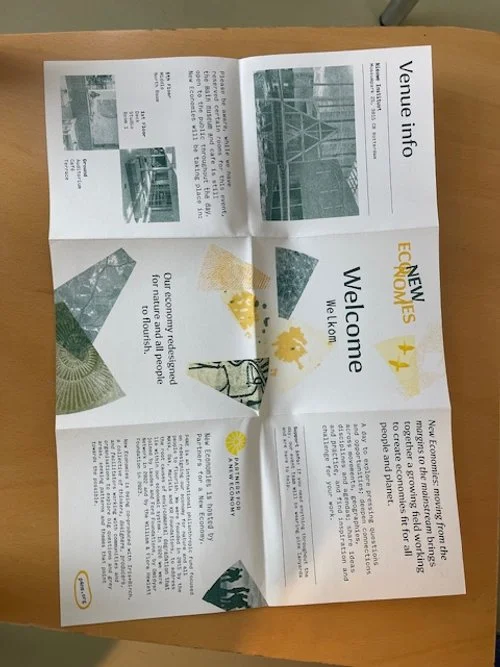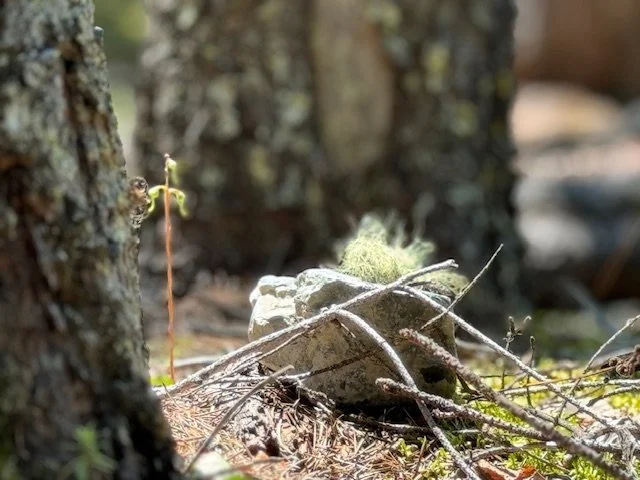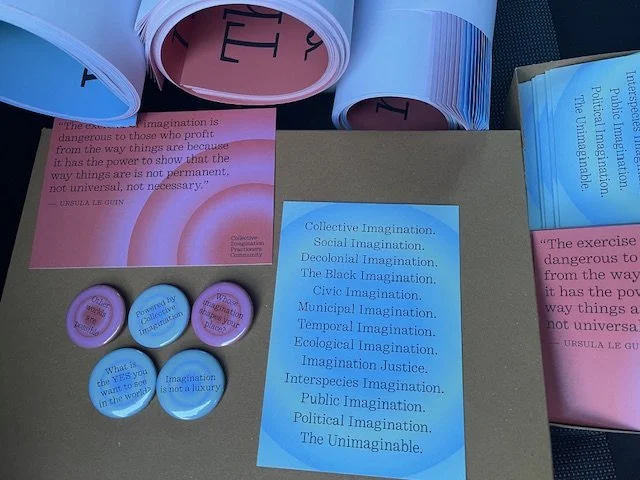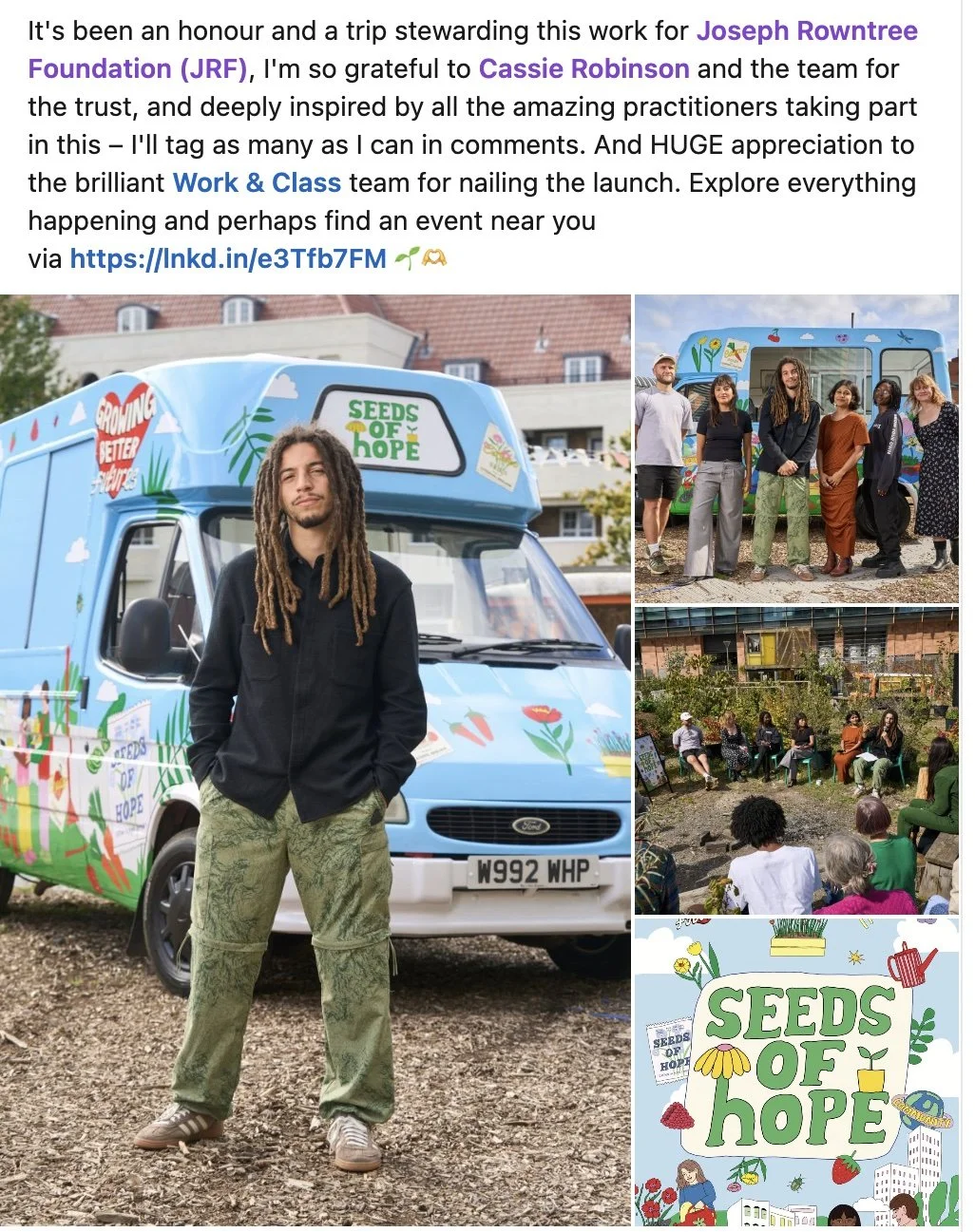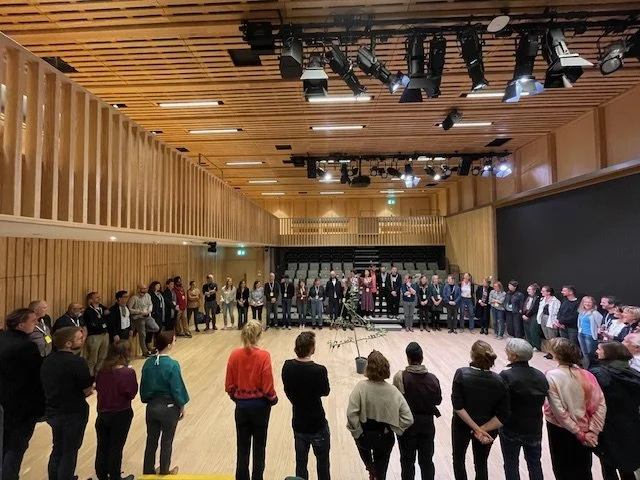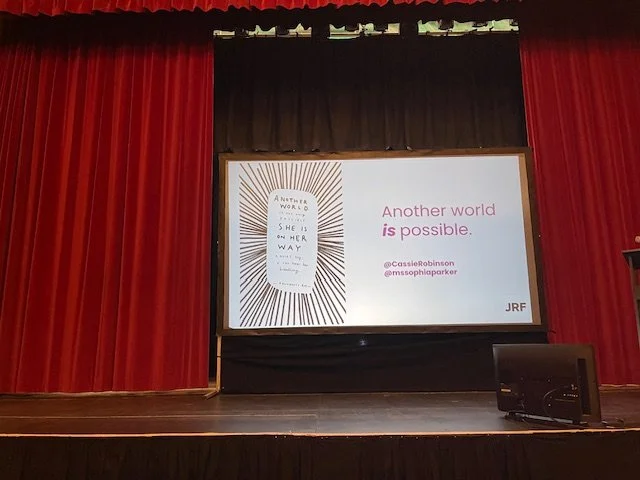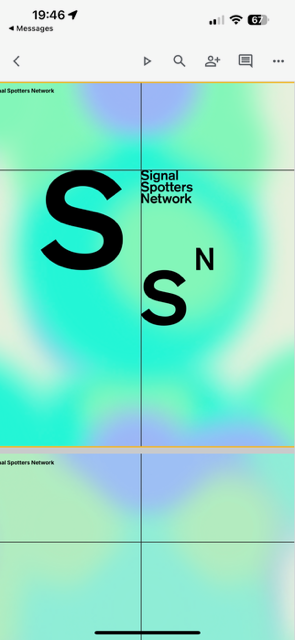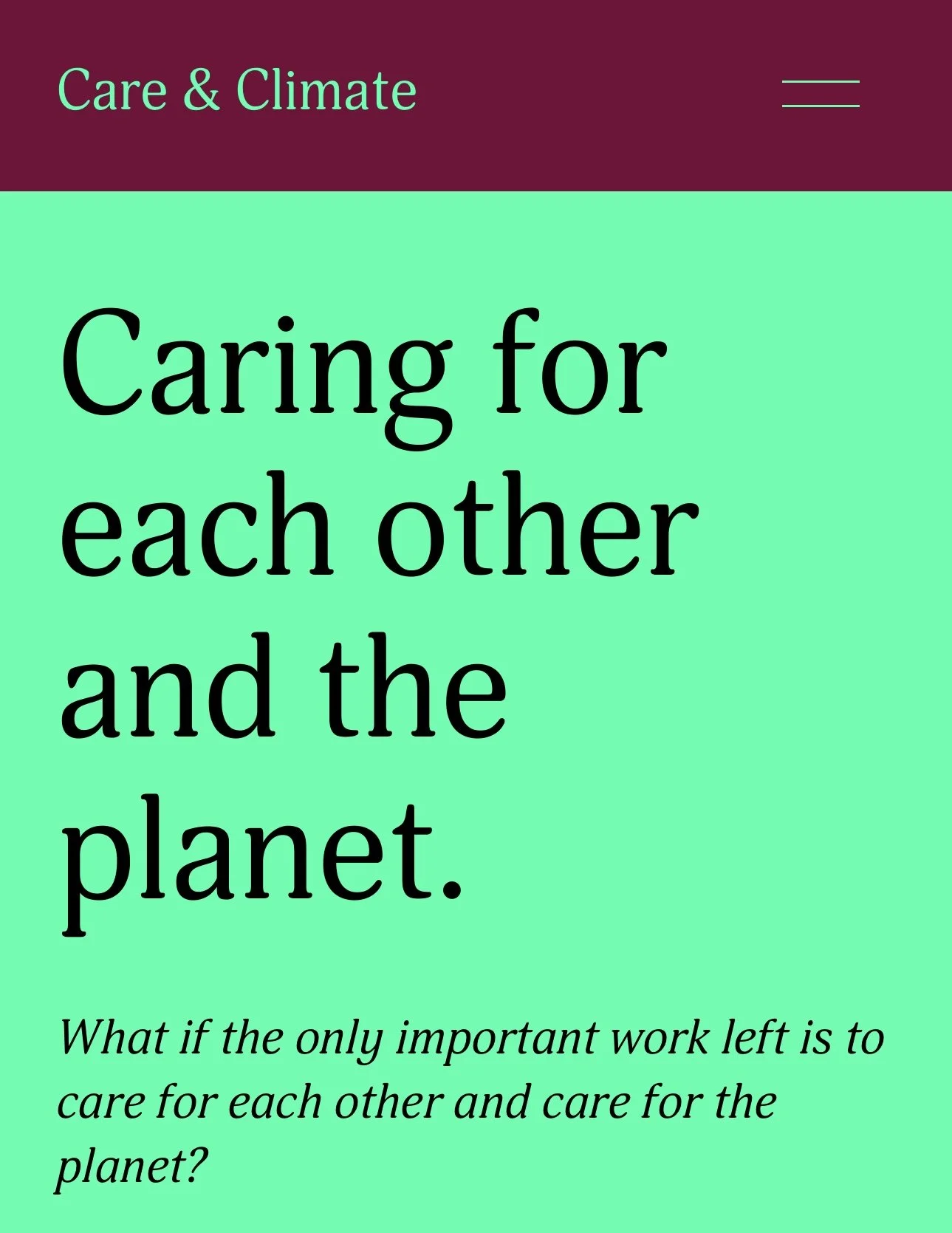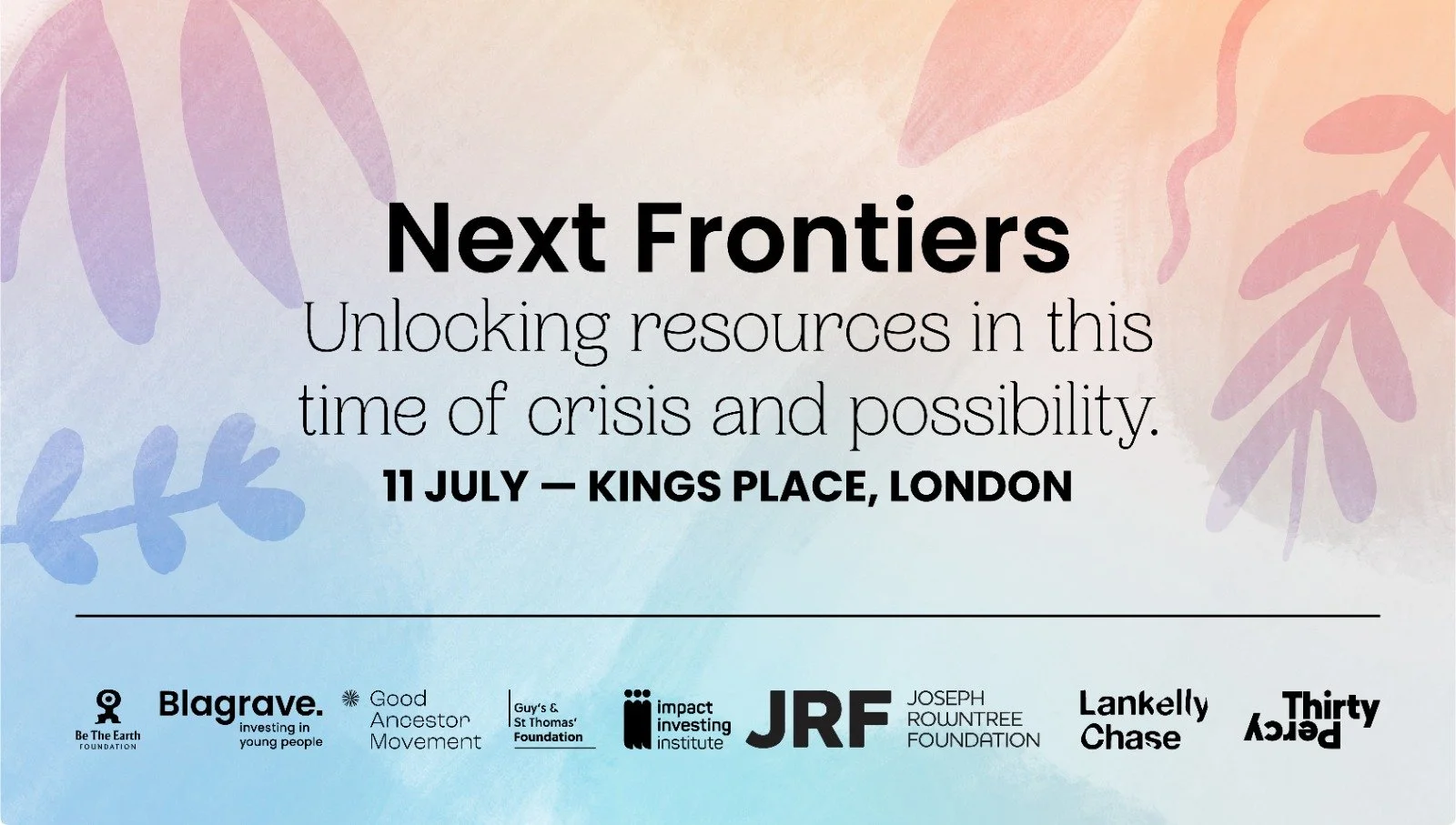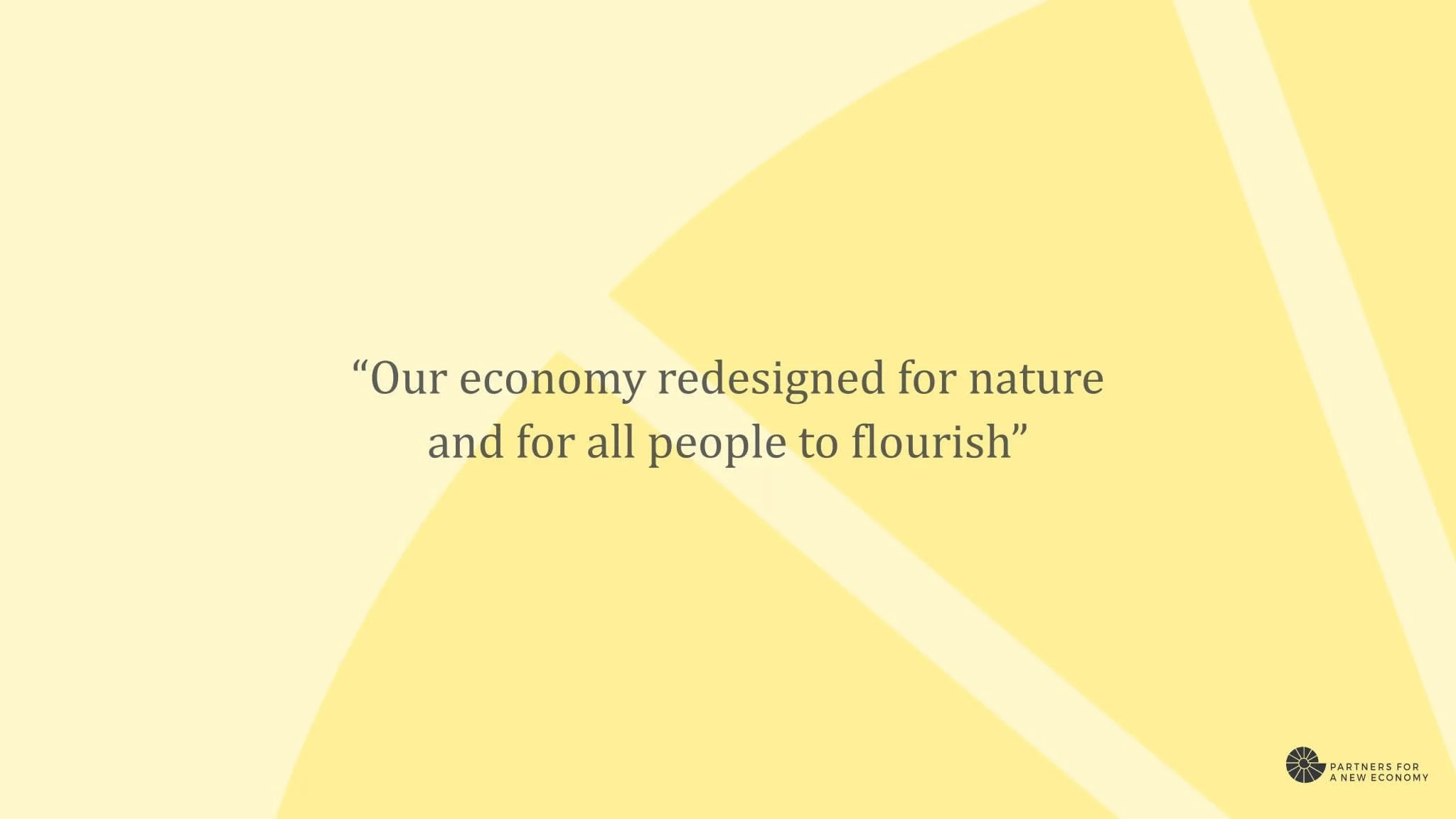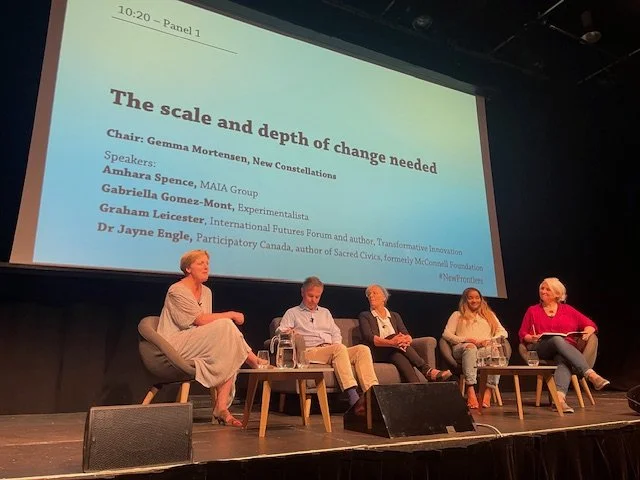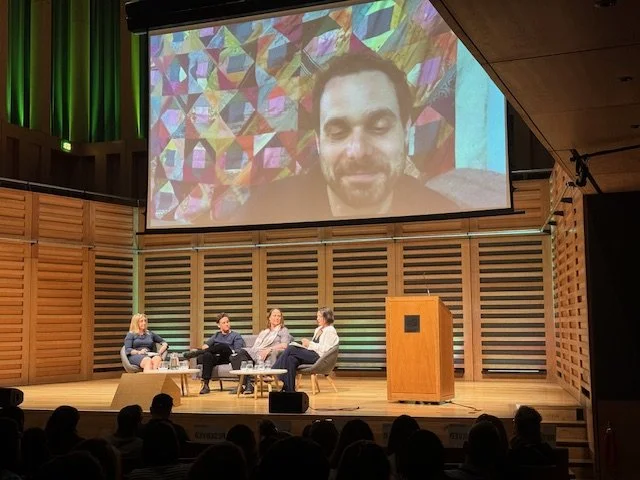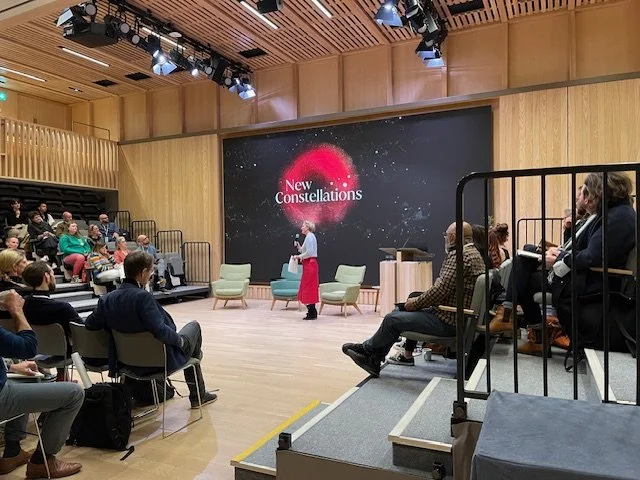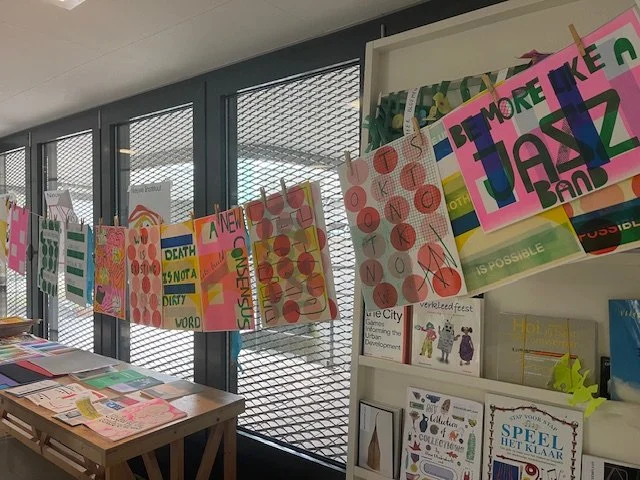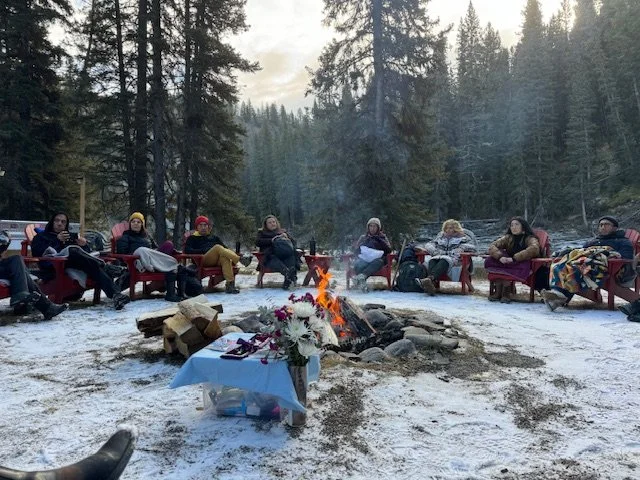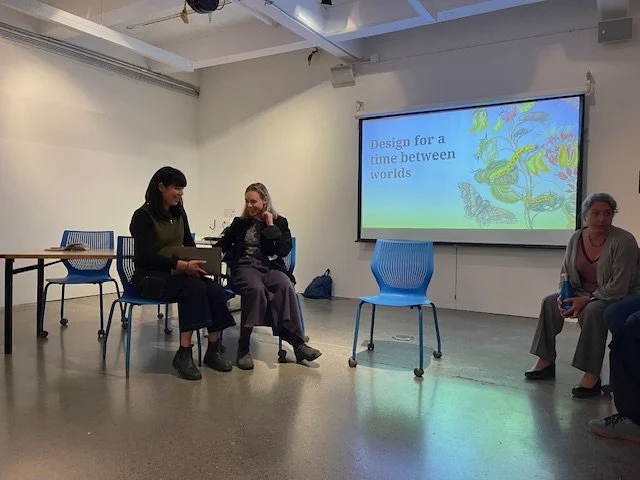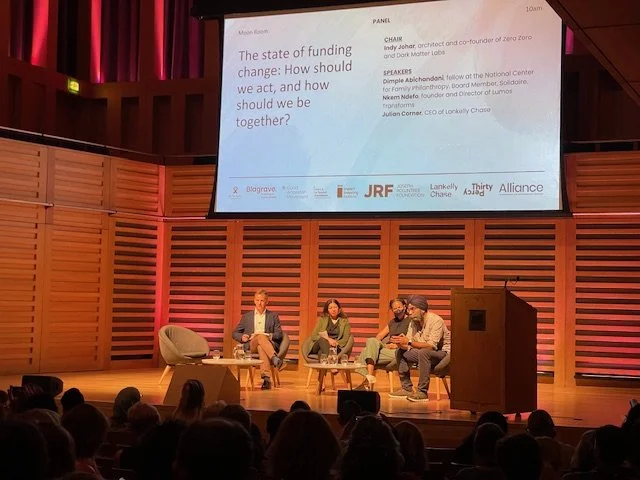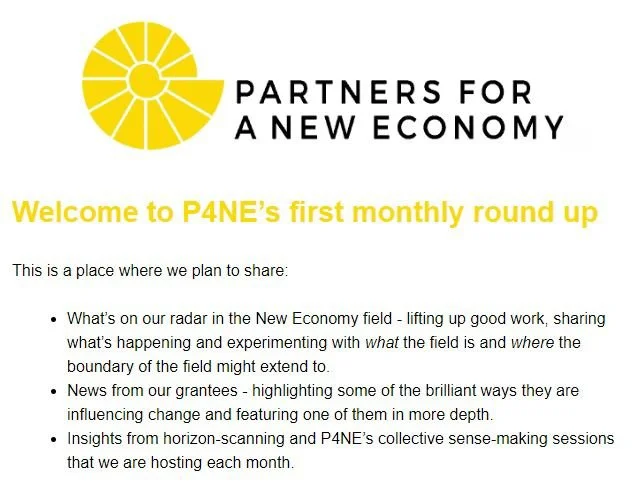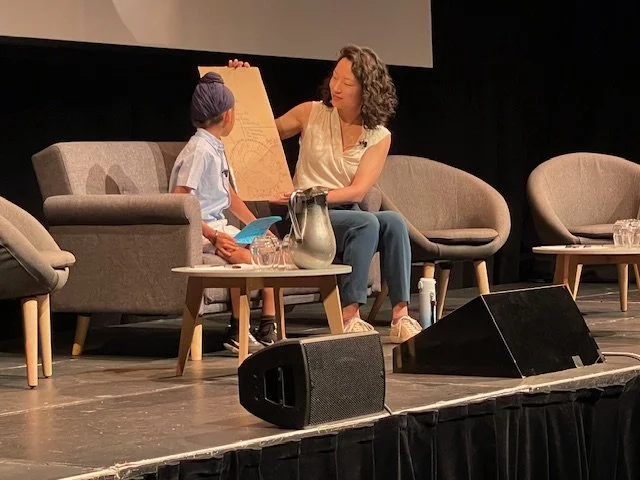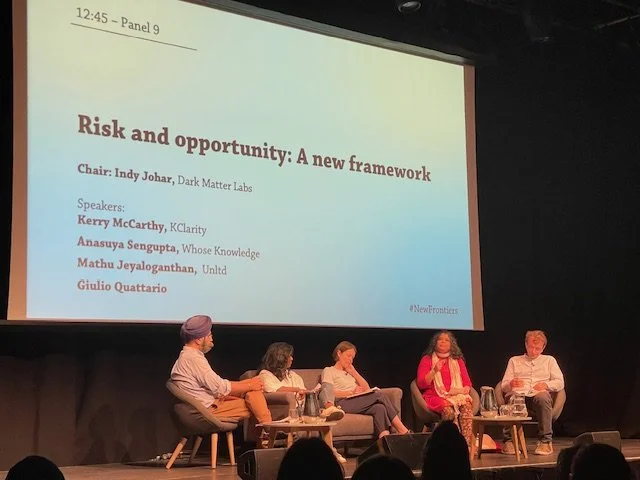The Common Threads.
You can see below the breadth of my experience working in and around philanthropy, wealth and the Impact Economy. However, there are consistent and common threads to this work, which has moved with me across roles and institutions. Through moments of upheaval, critique, and reconfiguration—I’ve stayed in relationship with a set of enduring commitments and continued to illuminate, nurture and resource them. Those common threads are >
-
In my first role as a funder at The National Lottery Community Fund, I established the Emerging Futures Fund to invest in communities to bring forth their collective imaginations, to seed and centre new narratives, opening up a space for change, for collective healing and for new possibilities to take root. Through the EFF, we funded 52 communities across the UK, and it was described by the OECD and the Observatory of Public Sector Innovation as a "unique exploratory funding mechanism for proactive policymaking." I mention this as a marker of how unfamiliar this work still is to dominant systems.
Many seeds from that Emerging Futures Fund are still alive today. These range from powerful visual storytelling—such as a film based on New Constellations' work in Barrow-in-Furness and Land We Can, which imagines a new future for land in the UK—to innovative civic approaches like Radicle Civics by Dark Matter Labs and CIVIC SQUARE's Department of Dreams. The work also generated critical thinking around community infrastructure, including Hilary Cottam's paper on building community capacity and Jessica Prendergast's blog on attachment economics. Community-led design was explored through Gentle/Radical's Doorstep Revolution and the Design Council's Design, differently project, while practical resources emerged like WCVA's community foresight resource.
I was trying to seed hope across the UK, as I wrote about here. A year later in 2021, I commissioned Unearthed to do a UK tour of rural and ‘left-behind’ places in the UK - with artists and culture-makers bringing collective healing and imagination into communities.
Seeds of Hope: Anchoring New Narratives
Four years later, in my role at Joseph Rowntree Foundation, I commissioned Seeds of Hope, which looked to seed and start to anchor new narratives and conviction around better worlds being possible, in order to grow the field of people and power actively engaged in building them. The work explored the role of place-based and experiential interventions that could help people experience new possibilities, and connect to the hope and collective action we know exists in communities.
The Critical Role of Narrative Work
As fatalism and resignation has taken root, narrative work has become central—because belief in better worlds is a necessary precursor to building them. In 2021, whilst at TNLCF, I commissioned a piece of work on Transforming Narrative Waters: Growing the practice of deep narrative change in the UK and gave Inter-narratives their first grant.
We are sorely lacking bold, visionary storytelling to bring better, 'H3' worlds to life, and deep narrative work to cultivate the conditions that will enable them. When at JRF I worked with Matt Golding to explore what this positive storytelling could look like and then seed funded his storytelling studio Rubber Republic to create an online hub for positive stories of community action.
Building the Field of Collective Imagination
Since 2019, I have played a role in building the field of 'collective imagination' in the UK. At TNLCF, this took form through the Emerging Futures Fund, but we also established a global event called 'Imagination Infrastructures' and began gathering and illuminating practices and resources. This piece in Alliance Magazine provides a good summary of some of the earlier work I was doing and the thinking behind it.
When I moved to JRF to help set up their Emerging Futures team, collective imagination became a core strand of work, especially as a way to destabilise the status quo. During my time there, I initiated the Collective Imagination Practice Community and the CIPC Fund, and curated and commissioned the Collective Imagination Toolkit. We also resourced two further Imagination Infrastructures events: one in 2023 hosted by Keri Facer and Gabriella Gomez Mont, and another in 2024 hosted by Alixa Garcia. Each of these yearly events attracted over 1,000 attendees.
All of these efforts are part of a broader commitment to ontological shift— a reorientation in what is seen as real, viable, and valuable.
-
When I started at TNLCF in 2018, the primary gap in UK philanthropy was insufficient funding for organisations addressing the polycrisis through deep systemic transitions. Rooted in long-standing relationships and deep field practice I could see a growing ecology of initiatives that was tackling multiple interlocking systems simultaneously, and requiring long-term funding commitments. This was propositional work that embodied and demonstrated plausible alternatives—glimpses of the future living in the present—that through practice was also revealing what broader cultural, policy and political changes are needed.
This was the thinking behind the Growing Great Ideas programme in 2020/21 (the development work and cover paper) and that work went on to inform the Pathfinders programme (now Regenerative Futures) at JRF, another programme I established and initially led. It’s still one of the most inspirational ecosystems of work and I hope further funding continues to flow into it.
After years as a minority voice advocating for transformative, alternative-building work in UK philanthropy, I commissioned research to evidence the funding gaps. The Onion Collective's pivotal study significantly influenced JRF's decision to release £25 million toward this work.
My commitment to this kind of work continues as part of my role at Arising Quo, focussed on a European ecosystem now.
-
When I joined the Joseph Rowntree Foundation in 2021 to help establish the Emerging Futures programme, I brought three years of experience and networks from working within philanthropy. I had also gained knowledge of social finance when the Point People were commissioned by the UK Government to bring a design-led approach to building a new 'market' in the early days of Big Society Capital. While at TNLCF, I had funded an initial exploration of 'Transition Investing.'
At JRF I was able to initiate, design, and lead a new stream of work focused on Reimagining Wealth, Philanthropy, and Investment—initially just Jonathan and myself. At that time, JRF was primarily known as a policy think tank that spent a small percentage of their endowment on grant-making and maintained a social investment portfolio focused on impact investing within current system rules. I played a catalytic role in broadening their strategic vision to include reconfiguring and reorienting the wealth system. I expanded their networks and positioned them within this emerging field, initially by establishing and curating the annual Next Frontier conferences, which we ran for three consecutive years from 2022 to 2024. In early 2023, I also commissioned Caroline Woolard to curate a learning journey for JRF and other UK funders exploring transformative investment, regenerative economics, and reparative and distributive economic principles.
Following the first Next Frontier conference, we commissioned New Constellations to undertake a scoping inquiry that clarified our direction for the reimagining wealth work. This was further informed by ongoing learning with core partners and aligned explorations [you can read more about those here]. During this time, I also co-founded the Wealth Hackers Initiative—an idea sparked during a New York convening in autumn 2023, where I sensed an opportunity and moved to bring it into form.
In parallel to my work at JRF I began working with Arising Quo, as an Impact Advisor, and after 3 years we now have a focus on redefining wealth, believing it can be a restorative force. We are committed to rewiring how and where financial capital flows, moving it into systems transformation and ‘proofs of possibility’ that are creating social, ecological and financial wealth.
In our first phase of learning at Arising Quo I commissioned New Constellations to design a ‘Mycellium Fund’, invested in Dark Matter Labs many-to-many governance experiments and worked with Gesturing Towards Decolonial Futures on European Wealth Narratives.
Alongside working with AQ, my role at the Wealth Shift Studio is where I am now continuing much of the work I was doing at JRF.
If you are interested in this field, the content from the Next Frontiers conferences is very rich.
Curated resources from the first Next Frontiers conference (2022), all of the videos and a reflective blogsummarising what was shared and learned.
Curated resources from the second Next Frontiers conference (2023), all of the videos and a reflective blog.
Curated resources from the third Next Frontiers conference (2024) and all of the videos.
-
I developed my systemic design practice through social innovation in the early 2000s, working across diverse contexts. This is where I explored and deepened my practice in various innovation and design methods—systemic, social, strategic, participatory, speculative, and transdisciplinary. When I entered the fields of philanthropy, investment and wealth, I wondered what practices existed there and what I might translate across from my previous experience. I wrote a blog about this a year in to the work and have continued to try and play a role in influencing practice in this field.
One thread has been foresight. Philanthropy rarely looks beyond the short term, yet the enormity of today’s polycrisis demands it. I’ve worked to stretch the field into longer timescales and deeper anticipatory practice.
Shifting Perspectives on Time - Philanthropy runs on short cycles, yet the crises we face unfold over decades and generations. Transition means holding time differently: balancing urgency with patience, and rooting decisions in responsibility to the future. Whilst at The National Lottery Community Fund I collaborated with Roman Krznaric to develop ‘Ancestral Grantmaking’ - developing workshops and materials for funders to discuss the structures that trap them in short-termism and to explore ways of adapting their practices so that future generations are centred.
Attunement to the Macro Context - Foresight is not prediction but pattern-sensing. It asks us to notice turbulence and emergence in political, ecological, technological, and cultural currents. I have tried many ways to encourage philanthropy to orient within these forces, not shield itself from them. This included:
Curating and delivering a ‘futures and foresight programme’ for my team at The National Lottery Community Fund — the programme, details of the speakers etc, can be found here.
Hosting a foresight and futures community of practice for Philea (previously the European Foundation Centre) for 2 years. Participants were strategy directors across the European philanthropy landscape.
I’ve given many talks and published to philanthropic audiences introducing different frameworks, practices etc.
Discernment of transformative potential - I worked alongside Gemma Mortensen at New Constellations and Graham Leicester at theInternational Futures Forum to develop an account of how to ‘spot glimmers’ - with the goal of equipping more resource holders and funders to be able to attune to identifying those third horizon patterns. We are in conversation about ‘glimmers of the future’ and here’s a practice checklist we developed.
Who Shapes the Future? - Foresight is never neutral. Whose data and stories shape it? I’ve not only tried to bring practices of foresight and foreseeing into philanthropic spaces, but also an awareness of who participates in it. and with “oracular bodies”—artists and practitioners who read the world in other ways. These experiments revealed the limits of technocratic foresight.
Whilst at TNLCF I commissioned a prototype for a Civil Society Foresight Observatory. This was to experiment with weaving together lived, learned and practice insight, as well as how to lay the foundations for a ‘foresight commons.’
At JRF I commissioned an exploration into ways of doing ‘breadth foresight’ - inviting many people from across many sectors and geographies to report on weak signals. Signal Spotters was the result of that.
At JRF I also commissioned Oracular Bodies - specifically to explore how those that are marginalised by the status quo - the shamans, the mystics, the seers, the ‘neurospicy’ - how are they foreseers, and how can we better protect and resource them.
At Arising Quo we experimented with grassroots movement data in partnership with Open Collective, as a ‘weather vane’ for where to move resources.
Shared Sense-Making - Shared sense-making invites people with different experiences to weave their perspectives together - often as those perspectives are just forming. It is slow, living work—relational, evolving, and sometimes uncomfortable, but vital for cultivating understanding across complexity. It’s also a way to create a culture that pays attention differently, together - to what’s on the horizon, to what is trying to emerge. I have brought this into several philanthropic spaces.
I set up a Scanning + Sensing Network in the TNLCF, which you can read about here. Graham Leicester from International Futures Forum supported us to build this practice, which he writes more about here. I’ve since helped other resource holders set this up as a practice, including P4NE and Natural Resources Wales.
Who’s Involved in Decisions? - Participation cannot stop at “participatory grant making.” Asking who is involved in decisions requires us to go further: who, beyond humans, is considered? How might we recognise the agency of rivers, forests, ancestors, or future generations in the decisions we make today? Expanding the circle of consideration unsettles philanthropy’s anthropocentrism and invites us into a much deeper accountability. At TNLCF I commissioned a piece of work that explored how we might co-evolve with tech in our decision-making, moving from collective intelligence to collective wisdom. With the existence now of Meta-Relational AI, the possibilities are huge.
At Arising Quo we commissioned some workto explore the emerging field of more-than-human governance and in my writing as a designer I wrote many years ago about ‘Beyond Human-centred Design.’ This also links to practices in governance. In our first phase of learning at Arising Quo I commissioned New Constellations to design a ‘Mycellium Fund’to explore how ecological principles could be used to govern a fund, and we invested in Dark Matter Labs many-to-many governance experimentsas a way to learn about works with a level of systemic complexity necessary for these times.
Somatic Practices - Our bodies are rarely brought into philanthropic practice yet in this work somatic intelligence carries a lot of wisdom. Somatic practice at its very basic helps regulate our nervous systems and with more practice it helps us grow the capacity to stay with complexity. I have been lucky to work with Nkem Ndefo with my team at TNLCF and then I brought her into work with the Emerging Futures team at JRF. I am also now introducing co-regulation with the more-than-human world into philanthropic and wealth redistribution practice having received my Ecological Literacy certification.
The Cultural Practice of Endings - Some organisations and projects must die to make space for the new. Working with endings is not failure but stewardship—composting legacies into fertile ground for what comes next. This has been a core practice that I’ve tried to introduce into philanthropy since I wrote this piece back in 2018 and through Stewarding Loss.
My work in Philanthropy, Wealth and the Impact Economy over the last 7 years.
The design of where wealth flows is a way of giving attention to new patterns and to shape what emerges. And whilst philanthropy is not justice and I’m fully on board with not wanting to uphold capital expansion based on an extractive, growth-dependent system, I do think wealth could be a restorative and regenerative force at this time.
Employed Roles
Associate Director, Emerging Futures, Joseph Rowntree Foundation. 2021 - 2025. I was part of the founding team that designed, set up and stewarded the Emerging Futures programme in its first three years. You can read about my portfolio of work at JRF here.
Associate Director, Kinship Fund, Paul Hamlyn Foundation. 2023 - 2025. I worked with the Trustees, CEO and a small team to scope out and design a new initiative and fund focussed on - ‘Young people in the UK are well equipped, well accompanied and well resourced to face an unknowable future together -one that lays the foundations of hope for future generations too.’
Deputy Director of Innovation, Policy and Practice, The National Lottery Community Fund. 2018 - 2021. I was initially hired as Head of the Digital Fund, then was promoted to Senior Head of UK Portfolio, and my last role was a promotion to Deputy Director of Funding Strategy - Innovation, Policy and Practice. You can read about my portfolio of work at TNLCF here.
Strategy Roles
I continue to work with Arising Quo on the design and stewardship of the organisation’s wealth redistribution strategy.
I’m working with the Roddick family on different aspects of their Foundation and Family Office strategy.
I sat on the original Design and Strategy Group for the Funders Collaborative Hub.
I worked with EarthPercent to design their funding strategy and set up their grant-making programmes.
I worked with Natural Resources Wales to redesign their funding strategy.
I was on the original Design Group for the Multitudes (now the Better Politics Foundation) helping it get started.
I worked with Client Earth to help design and set up their Innovation Lab.
I worked with the Earth Funding Lab in the early days of their strategic positioning.
Practice Roles
I write regularly for Alliance Magazine - a worldwide philanthropy and social investment magazine.
I designed and then Co-led a Field-building practice at Partners for a New Economy from 2022 - 2025.
I co-lead the design and delivery of Systems Changers, a programme for Lankelly Chase foundation on systems and complexity practices.
I was Innovator In Residence at Impact on Urban Health Foundation.
I ran the Foresight and Futures Community of Practice for the European Foundation Centre before they merged with Philea and went on to run a Practice lab for Transformative Philanthropy.
I worked with Local Motion, a place-based funder collaboration, the CEO’s and the Board members on aligning their governance, strategy and vision.
I brought my ‘conscious closure’ practice to work with the Shuttleworth Foundation so that they could develop a strategy and relational practice around bringing programmes and fellowships to an end. And with Stewarding Loss we prototyped a Careful Closures Fund.
A substantial part of my last 3 years of working in institutional philanthropy was at the JRF where I was initially in a team of two to set up and design the first 3 years of strategy and exploration for the Emerging Futures Unit. We grew to a team of about 20. An archive of my work there is here. Heading into 2024 I sent this round-up to many of our partners sharing an overview of the work and later in 2024 I curated this publication for Stanford Social Innovation Review that gathered together many threads of the work.
Below are some of the explorations and inquiries I initiated.
There's a lot here because in the first two-year learning cycle we deliberately took a very broad lens: seeding and nurturing a wide range of ideas and seeking to build as many partnerships and collaborations as possible. In this type of work, we can't always point to a blueprint for the future we are building towards, but we were able to use commissioning as a way to trace a direction of travel and to discern some important shifts and patterns that signalled emerging and adjacent possibilities in the present. It was also an important principle in the work that we lifted our eyes to what was happening internationally.

Some Reflections.
If you are interested, my thoughts on being a Funder are documented over time. Here I was 6 months into working at the TNLCF giving a talk at Nesta where I had been invited to ‘inspire them’. A year in and I shared 10 Things on My Mind as a Funder in an interview for Corra Foundation’s Strategy Review. 18 months in and I wrote two blog posts in the first few months of the pandemic about what was on my mind as a Funder. And my last post was two years into working at the Fund.
Just over a year into working as a Funder I also wrote a long piece about the skills and capabilities I thought we needed more of for more ambitious and effective grantmaking, and two of my most read blog posts are from 2021 on the Grantmaking Practices we Need and Funding The Third Horizon.
I share these as so many of my views are still the same and for the most part feel as relevant today as they did 8 years ago when I started in this work. I didn’t write very much whilst working at JRF because I didn’t have capacity, and perhaps it also wasn’t my role. Sophia wrote about our work though, which you can read here, and so did Urvi.
Earlier this year I also wrote about my 3 years at Partners for a New Economy and what we learned from setting up a more intentional field-building practice.

































